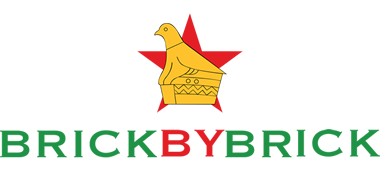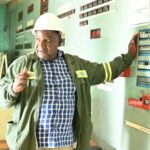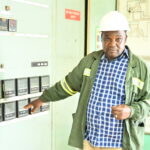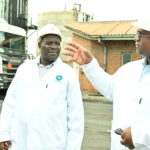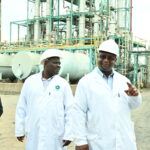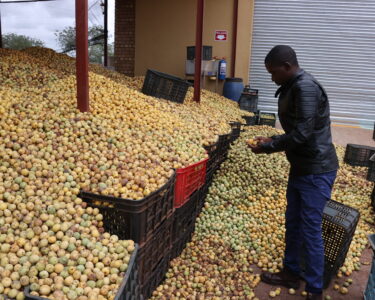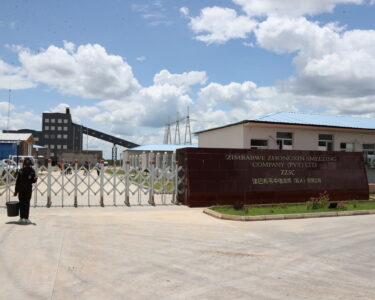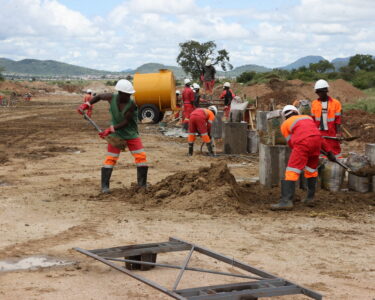There are some naysayers who will stick their necks out to proclaim that the illegal sanctions imposed on Zimbabwe are targeted only at a few elites in government. Others say the ruinous embargo has not had any impact on businesses while the naïve completely dismiss any sanctions talk as mere hallucinations. The folly is nauseating, but this is what coloniality has done to our country.
Recently, our Editor-in-Chief, Munyaradzi Huni, travelled all the way to the Midlands town of Redcliff where he had a chat with Tendai Shoko. The affable Shoko is the acting general manager of Zimchem Refiners and attributes the emerging strands of grey hair on his head to the years he has spent devising strategies to circumvent the embargo. This is a heart-breaking but fascinating story about resilience and financial engineering in a hostile environment, precipitated by the country’s detractors.
The soft-spoken Shoko is not one to beat about the bush when it comes to sanctions: “We are working around the clock to beat the illegal sanctions. It’s a tiresome job and very soon some of us will be growing grey hair as we devise ways to survive under sanctions.”
The grey hairs may not be clearly visible to the naked eye, but until the sanctions are lifted, people like Shoko will continue to have sleepless nights. “For us at Zimchem Refiners, the sanctions are not hearsay; they are real and they are bleeding us. There is a lot that we could have done, particularly last year. We had quite a number of export orders, but we could not fulfil them largely because of the sanctions. We could not export in the absence of guarantees that we would get paid for our sweat,” Shoko told Brick by Brick magazine.
A brief history of Zimchem
Established in 1989, Zimchem Refiners was commissioned around 1992-1993 for the purposes of beneficiating coke tar by-products. It processes crude tar, a coke oven by-product, used in the manufacture of a wide array of high-value products which include tar prime, stone pre-coat, road tar, coal tar fuels, creosote and pitches for the construction and allied industries. Apart from its long list of industrial products, Zimchem also produces a wide range of household and industrial chemicals and agrochemicals.
“We support the agricultural sector by producing creosote, which is used in the treatment of transmission and fencing poles. Zimchem is actually the leading supplier of creosote — one of the distillates from tar — to timber companies like Wattle Company, Border Timbers, Allied Timbers, etc.”
He added: “Our total staff complement, when we are running the BTX plant, the tar refinery plant and the new products plant should be around 130 employees. As of now, there are 90 people on our payroll, including graduate trainees and apprentices in addition to contract employees.
“Hopefully, when we secure our own coke oven batteries or when our shareholders are back in business, we will be in a position to beef up our workforce. The good news is that both Ziscosteel and Colliery have plans to refurbish some of their [coke oven] batteries. When that happens our capacity will also increase.”
But, there is more to the Zimchem sanctions saga than meets the eye, says Shoko, as he proceeded to break down the company’s shareholding structure. Says Shoko: “Zimchem Refiners is a subsidiary of Ziscosteel and Hwange Colliery Company {HCC], who are the two major shareholders. Ziscosteel has 35% shareholding while HCC holds 43%. The balance of the shares are held by two minority shareholders.
“At its [Zimchem] birth, between them Ziscosteel and HCC owned the biggest coke ovens in the country. Ziscosteel was able to provide Zimchem with 70% of its raw material requirements because it had the biggest battery infrastructure in Zimbabwe. Hwange supplied the other 30%.
“Around 2008, Ziscosteel and Hwange virtually closed owing to operational issues to do with sanctions and challenges in the mining and logistics sectors, among others. This led to bottlenecks in the raw materials supply chain, forcing Zimchem to rely solely of imports for its needs.
“Zimchem has the capacity to process 4 000 tonnes of tar and 1 000 tonnes of benzol per month. So when Ziscosteel and HCC could not deliver on their mandate, we turned to Hwange Coal Gasification Company which had a capacity to produce only 600 tonnes of tar per month. Unfortunately, they were not in a position to supply us with benzol because they did not have the necessary facilities.
“For some time we relied on benzol imports from South Africa-based ArcelorMittal. However, ArcelorMittal closed its own benzol refinery plan in 2012, forcing us to put our benzol plant on care and maintenance. Since we are still to secure an alternative source for our benzol needs, the benzol refinery plant is lying idle.
“However, the tar refinery plant is up and running thanks to the raw materials we are getting from Hwange Coal Gasification Company, Dinson Colliery and South Mining, all in Hwange. The downside is that they can only supply us with 1 600 tonnes per month, which is less than 50% of our requirements.
“For the time being, the only companies with by-product recovery type batteries are owned by the Chinese. We have other coke producers like Zambezi Gas, but their coking plant by-products fall far short of our standards.
“Our plan is to set up our own infrastructure for the supply of raw materials in the form of a coke oven battery in Hwange within the next five years,” explained Shoko.
But raw material supply bottlenecks are not the only reason Shoko is at the risk of developing grey hairs before reaching retirement age. He elaborates on Zimchem’s predicament as follows: “What makes our situation even more precarious is the fact that our plant was constructed using British technology. As you know, the UK was one of the architects of the sanctions against Zimbabwe. As a result, we cannot buy spares directly from Britain. We have to do it through proxies, which makes it quite cumbersome. The only way out of this conundrum is to wean ourselves from this reliance on foreign technologies, especially those from hostile countries. I think we are making good inroads in that direction.”
And then came the choking sanctions
Zimchem’s vision is “to provide chemical solutions for Africa”, but this is easier said than done as long as the ruinous sanctions are in place.
Laments Shoko: “The sanctions have taken a calamitous toll on our balance sheet, since we have millions of dollars frozen in foreign banks. We have a lot of money abroad which we cannot repatriate into the country due to the sanctions. Although our customers have paid up, the money is blocked in foreign accounts. For example, in 2015 we exported benzene worth US$40 000 to India but that money is still locked up in the Asian country.
“As we speak, Zimchem Refiners has almost 1 million rands locked up in South Africa and another US$70 000 in Zambia due to the sanctions. It’s a real nightmare.
“I have a strong feeling South African banks were recently approached by the US Federal Reserve Bank on the need to be tougher in terms of the Know You Customer (KYC) protocols. This is because in recent months, multinational banks with branches in South Africa have become even stricter with us with regards to paying us our dues. Payments that used to take 48 hours or less to reach Zimbabwe are now taking up two weeks or more because of the stricter KYC policy measures.
“We have also found ourselves at the receiving end of an endless stream of questionnaires probing into our board membership. When we respond to the questionnaires, they shift the goalposts by demanding additional information on the company’s shareholding structure. The want to know, for example, the identity of the major shareholders, etc, etc. It is a very cumbersome and frustrating exercise. The last time they did this was in October last year after which one of the South African banks froze our account.
“Since then, we have suspended exports to South Africa. However, the silver lining on what has otherwise been a perennially dark cloud is that we have managed to get around some of these challenges. We are Zimbabweans and we always come up with a Plan B. The sanctions have taught us to think outside the box and that is exactly what we are doing.
“For example, we have resorted to supplying the local market and third parties, who are free to export our products as they see fit. We had to take this route in a bid to bust the sanctions imposed on us as a business. We are also supplying creosote to third parties that are exporting it to Zambia and other regional markets. We would have been doing the exporting on our own, but because of our relationship with Ziscostee,l which is also under sanctions, we cannot.
This is our story – a sad story that we are slowly turning it into a success story,” said Shoko, a mischievous smile creasing his battle-hardened face.
From the smile, the writer could tell that Shoko was playing his cards close to his chest. It is something to be commended because when a business’s very survival depends on busting sanctions, you cannot afford to throw caution to the winds. But, what is clear is that, with or without sanctions, Zimchem will not go under. Instead, it will soon be flying Zimbabwe’s flag high.
Zimchem refuses to bow down to sanctions
Neither Zimchem or Shoko’s spirits have been dampened by the US’s misnamed Zimbabwe Economic and Recovery Act, better known by its acronym Zidera or ZDERA. Below Shoko spells out the past, present and future of his company.
“Basically, Zimchem produces creosote, road construction chemicals like tar prime and modified road tar. Although the Ministry of Transport [and Infrastructural Development] has been our major customer over the years, we are now one of the leading suppliers to some of Zimbabwe’s foremost road construction companies, notably Fossil, Tensor Systems, Exodus and others.
“We also process furnace fuels which we supply to foundries and smelters such as Steel Makers in the Midlands and Central African Batteries, among others.
“Before its shutdown, the benzol refinery plant was a leading producer of hydrocarbon solvents such as benzene, toluene and xylene. The three solvents are used in pharmaceutical; adhesive and rubber industry; and agro-chemicals industry, respectively. We have gone a stage further by adding value to these solvents by producing our own water- and solvent-based paints. Zimchem Refiners is not a fly-by-night company, so we take our quality control seriously. Take agro-chemicals, for example. They have been given a seal of approval by all the relevant statutory bodies. The laboratory and field trial stages are complete. What is left is now for us to set up a formulation plant to start producing the agro-chemicals on a commercial scale.
“Our long-term aim is to offer our farmers the full package — herbicides, insecticides and the acaricides. At the moment we are importing acaricides for cattle dipping from China. But such imports will be a thing of the past once our formulation plant is in place.
“Zimchem also manufactures a wide range of detergents like dishwashing liquid, greaser for cleaning engines, lacquer thinners from imported chemicals. We could easily produce these finished products at our BTX plant (benzol refinery plant) if it was running, using locally sourced inputs. But, until it comes back on stream, we shall have to make do with imports.”
The tar business has similarly been affected by supply chain bottlenecks, explains Shoko. “Zimchem currently exports pitch to South Africa where it is used as a raw material in the production of carbon electrodes paste. The electrodes paste is subsequently shipped back to our Zimbabwean customers like Zimasco, Zimplats, Unki, etc , at a much higher cost. I think the way forward is for Zimchem Refiners to set up its own electrode paste production plant for us to add value to the pitch for the benefit of our local smelting companies.
“We are also looking at regional companies in Zambia and South Africa as potential sources of raw materials to augment our local suppliers. We have already identified some of these potential suppliers. I know the sanctions are still in place, but we will come up with ways to go around them.”
Grappling with internal challenges
With millions of its export earnings frozen in foreign lands, how has Zimchem been surviving, Brick by Brick wanted to know. Order financing, came the answer. Shoko explains: “What I mean is that our customers pay us in advance for their products and that is how we have been keeping afloat. The largest amount we have received so far was ZWL$153 million from the Ministry of Transport [and Infrastructural Development] for its road construction programmes. Although we applied for the money in April 2021, it was only deposited into our account on the 31st of December 2021.
“At the time, it was a quite a windfall which we injected into the plant in order for us to produce the road surfacing chemicals and other products as per the ministry’s requirements. As soon as the money was disbursed, we were in a position to manufacture a variety of products some of which we channelled to the export market. The export drive was a deliberate move to hedge the value of the funding [against inflationary pressures]. We had outstanding export orders which we were able to fulfil for the better part of last year until the sanctions were tightened.
“However, we managed to roll over the money and we still are able to supply the road chemicals up to now. In between, we managed to bring in a lot of export revenue into the country which we had not done in years. We also managed to recapitalise the plant.”
Besides the sanctions, Zimchem has had to deal with other in-house issues threatening its viability, such as frequent cuts to its power and water supplies.
“For a start, Zimchem was getting all its services through Ziscosteel in terms of electricity, water and other services. Towards the end of 2021, Ziscosteel was saddled with a huge Zesa bill which it could not service. So Zesa switched off both Ziscosteel and Zimchem, since we were on the same meter.
“This was a wake-up call for us. It was time to wean ourselves from Ziscosteel in terms of power supply. We now have our own Zesa line, independent of Ziscosteel. It was a wise move on our part, because our parent company has been switched off again. If we had not parted ways we would also be grounded.
“Water supply is another headache. Redcliff Municipality is not a water authority. Zimchem Refiners gets its water from Kwekwe Municipality through Redcliff Municipality. The problem is Redcliff Municipality owes Kwekwe a substantial amount of money leading to frequent cuts in the water supply to Redcliff. This affects us big time.
“In order to circumvent this challenge, Zimchem has resolved to draw water from the nearby Kwekwe River. We have since erected a water treatment plant capable of treating raw water to meet our needs. However, the water treatment plant needs an uninterrupted power supply to work efficiently. To ensure that it is operational 24/7 we used part of the funding from the Ministry of Transport to purchase a standby generator.
“The other challenge is that, for years, we have wanted to buy speed pumps and other components for our steam boiler. But, given our limited resources, this has proved a bridge too far. However, we managed to invest part of the additional order financing we received last year into refurbishing the boiler. At the same time, we also embarked on a number of projects to make this entity self-sufficient as well as increase capacity utilisation.
“In terms of logistics, we rely heavily on the National Railways of Zimbabwe (NRZ), who are pivotal in ferrying both our raw materials and finished products. In this regard, NRZ has about 26 rail tankers dedicated to Zimchem. We resumed use of the tankers for the first time in 10 years last year.
“Rail allows us to move our products in bulk and so when NRZ sneezes, Zimchem catches a cold. We have resorted to using the NRZ because our fleet is depleted. All we have are two road trucks, which are not enough. Our only option is to hire additional trucks. We definitely need to look into the transport system at Zimchem and I am glad to say it is something we are giving serious attention to.”
Fluctuating tar prices
Last, but certainly not least, Shoko did not hide his disappointment at what he deems to be the elephant in the room — fluctuations in tar prices.
Laments Shoko: “The price of tar has become prohibitive. It is overpriced. It becomes expensive for us and it’s not economical. We are seeking [government] interventions to control the prices of tar and, if possible, ban or reduce their export.
“Just recently, we were faced with a 53% increase in the price of tar. When the Chinese companies [operating in Hwange] anticipate increased demand for tar, they hike their prices. This puts us at a disadvantage vis-à-vis our South African counterparts. In South Africa, prices don’t change, yet ours keep on fluctuating. As a country, we become uncompetitive because of our prices. So we will be constrained to procure our supplies from them. That is why we want a law enacted to control local tar prices.
“We are supposed to add value to the tar locally, but it is exported to South Africa, where it’s processed and comes back to us as creosote. We have the facilities to manufacture the creosote right here in Zimbabwe. We are, therefore, appealing to the powers-that-be for a Statutory Instrument (SI) to control the export of unbeneficiated tar.
“It’s difficult to do business in an environment characterized by fluctuating prices. For example, we recently got an order to supply about 600 tonnes of furnace fuel. But as soon as we started delivering the first 10 tankers, we received notification that the prices of raw materials had gone up by a whopping 53%. We engaged our suppliers because there was no way were going to pass on the 53% increase to our customers at such short notice. The new prices were not sustainable anywhere in the region. We are still looking into this issue in a bid to find a long-term solution.”

